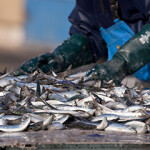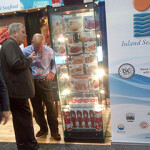“At-risk” EU fishers press for action on overfished mackerel ahead of coastal state talks

European negotiations on sharing Northeast Atlantic pelagic stocks are expected to resume later in September, and in advance of the talks, the E.U. fishing industry has renewed its calls for coastal states to prioritize a mackerel agreement that aligns with scientific advice and encompasses all parties.
The upcoming negotiations follow the hard deadline of 31 March, 2023, to reach an agreement on sharing Northeast Atlantic mackerel stock – set by the six coastal states of Norway, the European Union, the Faroe Islands, Greenland, Iceland, and the United Kingdom – which passed with no tangible outcome.
After that deadline, several events transpired that could complicate further negotiations. One is that Norway struck a bilateral agreement with the U.K. to share mackerel quota, a deal which the Irish Fish Producers Organisation (IFPO) said “ignores key aspects of [previous] discussions on the sharing of mackerel stock” and includes “irresponsible quota allocation consistent with IUU [illegal, unreported, and unregulated] fishing practices.”
The Norway-U.K. agreement grants Norway access to U.K. waters to fish up to 60 percent of its total allowable catch (TAC) on the condition that Norway reduces its unilateral TAC and pays in quota for access. Norway agreed to reduce its TAC to 31.95 percent from 35 percent and transfer 24,635 metric tons (MT) of mackerel to the United Kingdom.
The IFPO claims Norway has inflated its mackerel stock data and “trades some of this inflated quota with other countries so they can dramatically increase their catch in other parties’ waters.”
Norwegian representatives have repeatedly pushed back on such claims, but nonetheless, the Northern pelagic Working Group of the European Association of Fish Producers Organisations (EAPO) and the Association of National Organisations of Fishing Enterprises in the E.U. (Europêche) said in a joint statement that the deal doesn’t contribute to a “conducive environment” for the upcoming talks.
Northern Pelagic Working Group Chair and Europêche Vice President Tim Heddema said that to ensure truly sustainable management of Northeast Atlantic mackerel, a full-fledged sharing arrangement is necessary between as many parties as possible. As such, the bilateral U.K.-Norway agreement cannot replace an effective coastal states agreement nor should the agreement incorporate the U.K.-Norway deal into its framing, he said.
“The parties have all shown themselves capable of reaching bilateral, trilateral, and multilateral deals, albeit to differing degrees of satisfaction. With the right atmosphere, this should again be possible when mackerel discussions resume in September and October,” Heddema said.
Previous agreements include the deal coastal states signed in December 2022 on a total Northeast Atlantic mackerel quota of 782,066 MT for 2023. This aligned with advice from the International Council for the Exploration of the Sea (ICES) and resulted in a 1.6 percent decrease from the 2022 catch advice of 794,920 MT. However, the region’s 2022 TACs amounted to more than 1.31 million MT, showcasing the stark divide between guidance and what’s put into practice.
Further complicating upcoming negotiations, EAPO and Europêche claim Norway and the Faroe Islands have inflated their initial quotas by around 55 percent compared to levels spelled out in the most recent coastal states mackerel sharing arrangement. The two groups also state that in order for the Faroes to catch its unilateral quota, its fleet has been fishing for mackerel on summer feeding grounds, when the fish are in poor condition after their spawning migration.
EAPO and Europêche estimate that up to two-thirds of the total Faroese mackerel catch eventually became fishmeal and fish oil, deeming this process a wasteful practice that will have “long-lasting and damaging effect[s]” on mackerel stock.
Furthermore, Norway – where much of this fish was landed with permission of the Faroese government between 26 July and 31 August – helped to facilitate this practice, according to EAPO and Europêche.
Heddema said the unilaterally set Northeast Atlantic mackerel quotas by Norway and the Faroe Islands remain unacceptable and harm the efforts to pursue an all-inclusive agreement.
To ensure an effective coastal states agreement, EAPO and Europêche want the European Commission and E.U. Council to take concrete action against unilaterally set quotas. They also want the governmental bodies to make use of instruments at their disposal, such as trade measures, to develop a plan that benefits all parties...
Photo courtesy of Pelagic Freezer Trawler Association




Share